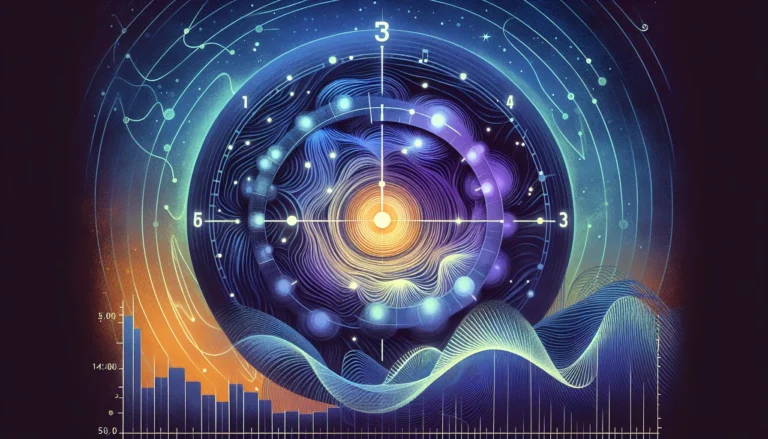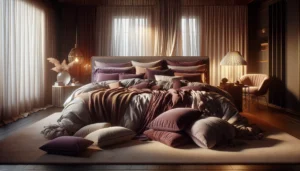Last Updated on April 22, 2025
What Causes Morning Erections in Men? A Professional’s Perspective
Morning erections in men are a common yet often misunderstood phenomenon. This article explores the scientific reasons behind these occurrences, drawing on insights from a medical professional. From hormonal fluctuations to sleep cycles, readers will gain a comprehensive understanding of this natural bodily function.
- Nocturnal Penile Tumescence: Body’s Self-Fitness Mechanism
- Sleep Cycles Trigger Hormonal Dance
- Full Bladder Stimulates Early Morning Arousal
- REM Sleep Activates Parasympathetic Nervous System
- Circadian Rhythm Boosts Testosterone Production
- Cortisol Reduction Promotes Morning Erections
Nocturnal Penile Tumescence: Body’s Self-Fitness Mechanism
From a physiological standpoint, morning wood–medically referred to as nocturnal penile tumescence (NPT)–is a normal, healthy phenomenon produced by the complex interaction of hormones, neurology, and vascular health. Increased blood flow to the pelvic region is caused by the parasympathetic nervous system during REM sleep cycles, while testosterone levels peak at above-average rates in the early morning hours. This biological process acts as the body’s self-fitness mechanism — essentially ‘working out’ erectile tissue in order to keep vessels healthy and oxygenated. You can think of it as your body self-diagnosing on the sexual function front. In fact, loss of morning erections is sometimes an early warning signal of heart problems or hormone deficiency.
There are two types of morning wood: nocturnal penile tumescence (NPT), which usually occurs during the REM stage of sleep and can happen up to five or six times a night (not all men can remember them, however), and good old “morning wood,” which is blissfully post-sleep. (Men are basically like printing using ink on a roller.) While people joke about morning wood, it’s actually an important biomarker of men’s health. The phenomenon is usually due to a flood of noradrenaline and dopamine during the last sleep stages, and weakened inhibiting signals from the brain’s prefrontal cortex after waking. It’s nature’s way of making sure the old “rocket” is firing on all cylinders — studies have shown that men have 3-5 nighttime tumescence (NPT) events a night, the strongest generally occurring in the last REM cycle before we rouse for the day. These spontaneous erections are far from purely sexual; they are evidence of the amazing autonomic regulation of our bodies. But if frequency drops precipitously or ceases altogether — especially in younger men — it is worth mentioning to a physician to assess vascular, neurological, or endocrine health.
 Kevin Huffman
Kevin Huffman
Doctor of Osteopathic Med| Bariatric Physician| CEO & Founder, Ambari Nutrition
Sleep Cycles Trigger Hormonal Dance
Morning erections in men are primarily caused by hormonal fluctuations during sleep. As the body goes through different sleep cycles, testosterone levels naturally rise and fall. This hormonal dance plays a crucial role in triggering penile engorgement, leading to what is commonly known as ‘morning wood.’ The increase in testosterone during the night not only contributes to these erections but also helps maintain overall sexual health.
Understanding these natural bodily processes can help men feel more at ease about their morning experiences. For those concerned about their morning erections or lack thereof, it’s advisable to consult with a healthcare professional for personalized advice.
Full Bladder Stimulates Early Morning Arousal
The pressure exerted by a full bladder can stimulate nocturnal erections in men. As the bladder fills during the night, it presses against nearby nerves and blood vessels, which can lead to increased blood flow to the genital area. This physical stimulus often results in an erection, particularly in the early morning hours when the bladder is at its fullest.
While this mechanism is not the sole cause of morning erections, it is a significant contributor for many men. Recognizing this connection between bladder fullness and erections can help explain the frequent occurrence of morning arousal. If you notice any changes in your morning erections or urinary habits, it’s worth discussing these observations with a doctor.
REM Sleep Activates Parasympathetic Nervous System
The relationship between REM sleep and morning erections is fascinating. During REM sleep, which typically occurs in the early morning hours, the body’s parasympathetic nervous system becomes more active. This part of the nervous system is responsible for ‘rest and digest’ functions, including increased blood flow to various parts of the body. In men, this increased blood flow often results in penile engorgement and erections.
These sleep-related erections are a normal and healthy part of male physiology. They serve important functions, such as oxygenating penile tissues and maintaining erectile capacity. To support healthy sleep patterns and, by extension, normal morning erections, consider establishing a consistent sleep schedule and creating a relaxing bedtime routine.
Circadian Rhythm Boosts Testosterone Production
The body’s circadian rhythm plays a significant role in the production of testosterone, which in turn influences morning erections. Testosterone levels in men typically peak in the early morning hours, coinciding with the end of the sleep cycle. This natural surge in testosterone contributes to increased penile blood flow and erections upon waking.
The circadian rhythm’s influence on hormone production is an essential aspect of male reproductive health. It’s not just about erections; this daily hormonal cycle affects energy levels, mood, and overall well-being. To support a healthy circadian rhythm, try to maintain regular sleep and wake times, even on weekends, and expose yourself to natural light during the day.
Cortisol Reduction Promotes Morning Erections
The reduction of cortisol levels overnight is another factor that promotes morning erections in men. Cortisol, often referred to as the stress hormone, typically decreases during sleep, reaching its lowest point in the early morning hours. As cortisol levels drop, the body becomes more relaxed, and blood flow increases to various areas, including the genitals.
This natural decrease in stress hormones, combined with the relaxed state of sleep, creates an ideal environment for erections to occur. The relationship between stress, hormones, and sexual function underscores the importance of stress management for overall health. Consider incorporating stress-reduction techniques like meditation or deep breathing exercises into your daily routine to support hormonal balance and sexual health.











